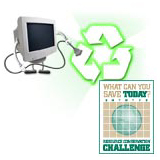Winter Tips

Go green for the holidays: Reduce waste, save energy, and more
- Reduce waste and recycle your tree
- Save energy and money on electronics and at home
- Have a water efficient H2Oliday!
- Look for the "Design for the Environment" label
Protecting Your Family's Health
- Snow and ice: emergencies and safety measures
- Protecting yourself and your family from radon in the winter
- Winter heating safety resources
- Winter air quality
Energy Efficiency and Resources
- Stay warm, lower your bills and help the environment
- Energy saving for your business
- Ducts
- Residential energy efficiency
- More tips for weathering the winter
- E-cycling electronic gear you no longer use
- February fun without waste
Go Green: Reduce waste during the holidays and parties
 Thousands of paper and plastic shopping bags end up in landfills every year. Tell store clerks you don't need a bag for small or oversized purchases. Approximately 33 million live Christmas trees are sold in North America every year. Find more ideas for reducing holiday waste. and how to reduce waste from parties. En español: Reduciendo el desecho de las fiestas
Thousands of paper and plastic shopping bags end up in landfills every year. Tell store clerks you don't need a bag for small or oversized purchases. Approximately 33 million live Christmas trees are sold in North America every year. Find more ideas for reducing holiday waste. and how to reduce waste from parties. En español: Reduciendo el desecho de las fiestas
Branching out? After the holidays, look for ways to recycle or reuse your tree instead of sending it to a landfill. Check with your community solid waste department and find out if they collect and mulch trees. Tree recycling ideas ![]()
More holiday tips from other Agencies
Energy-efficient electronics save money and help protect the planet
Look for home or office electronic products with the Energy Star label when you shop. Many electronics use energy even when they're "off" to power continuous features like clock displays or remote controls. Replacing old items with energy-efficient models can save over 25 billion pounds of greenhouse gas emissions, and save money on your energy bills. Energy efficient products and gifts. More about home electronics, office equipment.
Home for the holidays? A typical household spends about $1,900 a year on energy bills and contributes twice the amount of greenhouse gases to the environment as an average car. Use the Energy Star Home Advisor for ideas projects to increase energy efficiency and comfort in the area where you live.
Have a water efficient H2Oliday!
Preparing for and cleaning up after a holiday meals and parties can use much more water than ordinary, everyday use. Running your tap continuously while preparing food or washing dishes wastes water and can use more than two gallons of water every minute your tap is running. That's a lot when you're cooking a big meal for extended family members and friends! Find ways to reduce your water and energy use, for example:
- Scrape dirty dishes clean, instead of using water to rinse them before you put them in the dishwasher.
- If you don’t use a dishwasher, fill the sink with a few gallons of soapy wash water, clean your dishes, and put them aside. Then rinse them all together afterward.
Either of these simple practices could save 10 gallons of water. If every American household reduced their water use by 10 gallons on just Thanksgiving Day, it would save more than 1 billion gallons of water, as well as save any energy or materials used to pump or treat tap water. More tips on WaterSense water-efficient products.
Look for the "Design for the Environment" label
 Look
for products carrying the "Design for the Environment" label.
This mark allows consumers to quickly identify and choose more products
that are safer for their families and also help protect the environment.
DfE uses scientific information to identify products designed to be safer
for the environment and to help you choose products and services, such
as electronics or automotive refinishing.
Look
for products carrying the "Design for the Environment" label.
This mark allows consumers to quickly identify and choose more products
that are safer for their families and also help protect the environment.
DfE uses scientific information to identify products designed to be safer
for the environment and to help you choose products and services, such
as electronics or automotive refinishing.
In 2011, Americans using products with the DfE label cut the use of harmful chemicals by more than 756 million pounds. Look for the DfE label to find products with the safest possible ingredients and help protect the environment.
Snow and Ice Emergencies
Winter conditions can create specific environmental problems, indoors and out. More about the dangers and how to protect yourself.
- Generator exhaust is toxic. Always put generators outside well away from doors, windows, and vents. Carbon monoxide (CO) is deadly, can build up quickly, and linger for hours.
- Communities and airports: learn more about road salt and deicing.
- More about snow and ice dangers.
Protecting Yourself and Your Family From Radon
Radon levels can soar during the colder months when residents keep windows closed and spend more time indoors. As many as 22,000 people die from lung cancer each year in the United States from exposure to indoor radon.
The EPA Administrator urges Americans to heed January as National Radon Action Month by testing their homes for one of the leading causes of lung cancer in the country, indoor radon gas. Approximately one home in 15 across the nation has unacceptably high radon levels; in some areas of the country, as many as one out of two homes has high levels
EPA Recommends:
- Test your home for radon -- it's easy and inexpensive.
- Fix your home if your radon level is 4 picoCuries per liter (pCi/L) or higher.
- Radon levels less than 4 pCi/L still pose a risk, and in many cases may be reduced.
- Read EPA's "Citizen's Guide to Radon: The Guide to Protecting Yourself and Your Family From Radon."
- January is National Radon Action Month
For more information about radon testing, call EPA's hotline at 800-SOS-RADON or find out who can test or fix your home.
Winter Heating Safety
Generator exhaust is toxic. Always put generators outside well away from doors, windows, and vents. Carbon monoxide (CO) is deadly, can build up quickly, and linger for hours. More information
 Combustion
appliances are those which burn fuels for warmth, cooking, or decorative
purposes. Typical fuels are gas, both natural and liquefied petroleum;
kerosene; oil; coal; and wood. Examples of the appliances are space heaters,
ranges, ovens, furnaces, woodburning stoves, fireplaces, water heaters,
and clothes dryers. These appliances are usually safe. However, under
certain conditions, these appliances can produce combustion pollutants
that can damage your health, or even kill you.
Combustion
appliances are those which burn fuels for warmth, cooking, or decorative
purposes. Typical fuels are gas, both natural and liquefied petroleum;
kerosene; oil; coal; and wood. Examples of the appliances are space heaters,
ranges, ovens, furnaces, woodburning stoves, fireplaces, water heaters,
and clothes dryers. These appliances are usually safe. However, under
certain conditions, these appliances can produce combustion pollutants
that can damage your health, or even kill you.
Possible health effects range from headaches, dizziness, sleepiness, and watery eyes to breathing difficulties or even death. Similar effects may also occur because of common medical problems or other indoor air pollutants.
A properly installed, correctly used wood-burning appliance should be smoke free. If you see or smell smoke that means you may have a problem. Never burn household garbage, colored paper or ink, or any type of plastic, foam, or other artificial materials. Burning these can release harmful chemicals. Practice these guidelines to Burn Wise.
Winter Air Quality
 EPA
, together with state and local governments, has expanded air quality
forecasting to include year-round, daily information on particle pollution.
"Particle pollution" consists of microscopic particles in the
air that can get deep into the lungs, potentially causing serious health
problems. Unlike summertime ozone, particle pollution can occur throughout
the year. Although particle levels aren't high every day, you should check
your Air Quality Index (AQI) forecasts to determine whether you need to
take action to reduce your exposure. Forecasts, health information, and
maps showing real-time particle levels are available on EPA's AIRNow web
site at: www.epa.gov/airnow.
EPA
, together with state and local governments, has expanded air quality
forecasting to include year-round, daily information on particle pollution.
"Particle pollution" consists of microscopic particles in the
air that can get deep into the lungs, potentially causing serious health
problems. Unlike summertime ozone, particle pollution can occur throughout
the year. Although particle levels aren't high every day, you should check
your Air Quality Index (AQI) forecasts to determine whether you need to
take action to reduce your exposure. Forecasts, health information, and
maps showing real-time particle levels are available on EPA's AIRNow web
site at: www.epa.gov/airnow.
 Stay Warm, Lower Your Bills and Help the Environment
Stay Warm, Lower Your Bills and Help the Environment
Improve your home's comfort and save energy and money while doing the right thing for the environment. By using energy efficiently in your home, you can make a difference by preventing air pollution from power plants. Follow EPA's simple recommendations.
Energy Saving for Your Business
Find financial resources, find ENERGY STAR products and services, calculate your savings, receive free technical help, get a no-cost upgrade manual, and get recognition for your efforts.
Ducts
 It's
the time of year when homes have their highest energy demand of the year.
Heating accounts for 34% of all annual utility usage and is part of what
makes an average home twice the emitter of carbon dioxide emissions as
a vehicle. Here is a way to reduce the demand for expensive space heating.
It's
the time of year when homes have their highest energy demand of the year.
Heating accounts for 34% of all annual utility usage and is part of what
makes an average home twice the emitter of carbon dioxide emissions as
a vehicle. Here is a way to reduce the demand for expensive space heating.
Check the ducts. To ensure that as much warm air as possible is delivered through your central system, check the ductwork and wrap any leaks with duct mastic. Distribution losses (what's lost while air is transported from your furnace through ductwork to the vents) often amounts to 30%. So, sealing ductwork could increase efficiency and the warm air you receive considerably ... keeping you warmer and making your furnace work less. Should You Have the Air Ducts in Your Home Cleaned?
More Tips for Weathering the Winter 
- Consider using non-toxic de-icing substances such as clean clay cat litter, sand, or fireplace/stove ash to prevent hazardous waste from chemicals. Chemical de-icers can be hazardous to your pets, your trees and shrubs, and the environment. Antifreeze that leak from car engines and chemical snow melters on driveways, roads, and runways can pollute surface waters and groundwater through the soil.
- Winterize your vehicle by checking your air filter and fluid levels, checking tires for tread wear and proper inflation, and checking the condition of your windshield wipers. Ensuring your vehicle is ready for weather changes will reduce damage, which prevents waste from broken parts, and will keep you safe on the road.
- If you have a wood-burning fireplace, save your ashes in a tin instead of throwing them away. Cold wood ashes can be mixed in your compost heap to create a valuable soil amendment that provides nutrients to your garden.
- Use electric snow removal products rather than gasoline-powered ones. While electric products consume energy, they do not emit greenhouse gases. As alternatives, use snow shovels, ice crackers, and brooms to clear snow from your sidewalk, porch, or driveway.
- If you have a manual thermostat or no thermostat at all, one way to save energy and money this winter is to install a programmable thermostat. When installed and used with the four pre-programmed temperature settings for weekend and weekdays, you can save about $100 each year while staying comfortable. Before leaving for vacation, turn down your thermostat (or use a programmable one) so that you don't waste natural resources by generating unneeded heat. You can also buy outdoor and indoor lights with timers so that lights don't stay on all night.
- Close the recycling loop. Many articles of clothing, such as jackets, scarves, gloves, and boots, are now made from recycled materials. Most fleece products are made from recycled plastic soda bottles, and certain clothing and shoe manufacturers use recycled cotton scraps and rubber tires to make their products.
- Winter storms often cause power outages. Prevent waste by keeping rechargeable batteries rather than disposable ones stored throughout your house with your flashlights. If you do use disposable batteries, prevent hazardous waste by buying batteries with low mercury content.
- Recycle old newspapers by making rolled paper logs for your fireplace. Roll newspaper sheets around a broom stick until your log is the desired size, then soak your log thoroughly in water. Dry the log overnight and use like ordinary wood. Always follow proper safety precautions when burning anything around your home.
- To make sure your heating system (boiler, furnace or heat pump) is operating at its most efficient, it is a good idea to have a contractor perform a routine check-up and any necessary maintenance on the equipment before freezing weather drives up your energy bill.
- If your heating equipment more than ten years old, it may be time for a replacement to a more energy-efficient unit. While initially an expensive investment, replacing old equipment with ENERGY STAR qualified equipment saves more energy and money in the long run.
E-cycling Electronic Gear You No Longer Use
 Is
your old TV serving as a coffee table while your retired computer is doubling
as a plant stand? And with new technology introduced every day-more powerful
computers, HDTVs, and combination wireless phone and internet, do you wonder
just how many plant stands and coffee tables you have room for?
Is
your old TV serving as a coffee table while your retired computer is doubling
as a plant stand? And with new technology introduced every day-more powerful
computers, HDTVs, and combination wireless phone and internet, do you wonder
just how many plant stands and coffee tables you have room for?
You're not alone; that's why EPA launched a campaign to get the word out about opportunities to reuse and recycle your old computers, TVs, and cell phones.
Motivate yourself to start E-cycling by watching a short video.
February Fun Without Waste
This Valentine's Day, show your love for the earth by sending recycled-content greeting cards. Consider making new cards from scrap paper or by attaching new backs to the fronts of old cards—this can be a craft project for family and friends that helps everyone reduce paper waste while saving money! Also consider sending electronic valentines. More | En español
